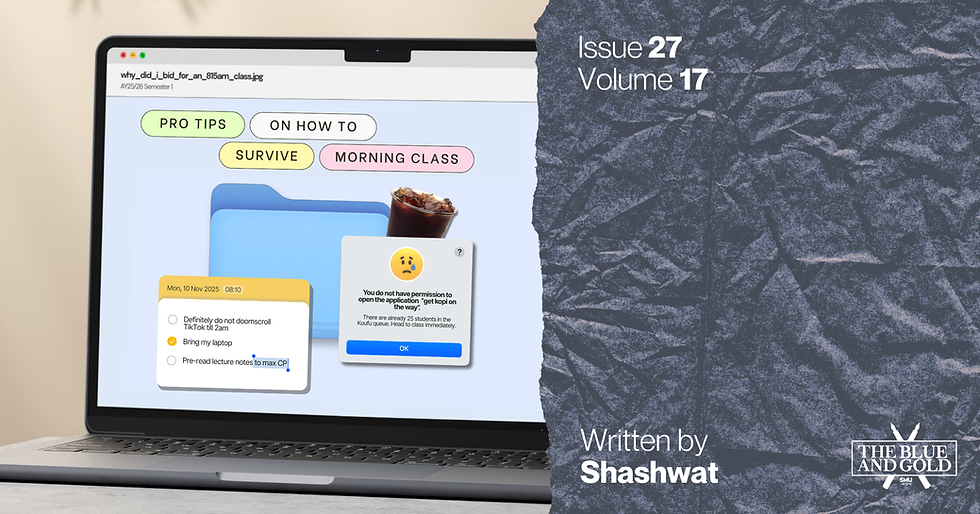Our Singlobal Identity
- Jordan Foong
- Oct 26, 2025
- 4 min read
From the careers we chase to the food on our plates, globalisation has revolutionised the way we define what we desire. As borders blur, what makes our Singaporean identity truly distinct? Follow our writer, Jordan, as he unpacks, through his grandmother, father and himself, what identity means in the globalising world.

What is your first impression of Singapore? A global financial hub would be the general answer. As a multicultural and developed country, many are attracted to form commercial relations with and through our country. This, however, affects us Singaporeans in terms of our opportunities, culture and work-life balance. You might think that our views on globalisation may differ from those of our parents and grandparents, primarily because we’ve been living in different eras. For example, they might have a more conservative mindset where they dislike change, whereas we might have a more liberal mindset where we accept change. Having made it my life’s mission this mid-term break to question and observe my parents, grandparents and friends’ opinions on the above 3 aspects, I think you will see that based on my findings, we are not as different as you might think.
When it comes to opportunities, globalisation means access. Our professional and casual lives benefited much from these: Overseas internships, international colleagues and professors, as well as global learning resources. Favouring countless online platforms from LinkedIn to YouTube reinforces this flexibility as they allow us to access relevant career information and learning mediums that improve our options. The globalised world is seen as one where doors are open. Surprisingly, this is also the case with my father, who agrees that nowadays “you can move to other countries for higher quality jobs and knowledge transfer is easier than ever”, providing a more level playing field for everyone. Looking back, it makes sense that he thinks this way, with him working at Shell, a foreign company that invested its business in Singapore. This truly clashes with my initial expectation that he would be more conservative since he was born before globalisation started expanding.
Another aspect is culture. SMU students tend to embrace multiple cultures. We might enjoy chicken rice for lunch, then have sushi as a snack, and later talk to friends in mixed languages. I do not see this as losing my Singaporean identity but rather, an expansion of it. My grandmother, however, worries that I am discarding my history and still nags me to this day to learn the Cantonese language and observe Chinese festivals like the Mid-Autumn Festival. For her, globalisation appears more like a “paintbrush smearing us all in the same colour”, where we forget what makes us unique. My father shares a similar understanding that “foreign culture can be disruptive to local Singapore culture and that foreigners should find a way to integrate with our local community.” Indeed, our perspectives do differ here as I focus more on the diverse cultures available to me, while they care more about preserving our historical culture. Perhaps trying to view the glass half full instead of half empty is a possible solution to align our perspectives.
Finally, we come to globalisation’s impacts on work-life balance. Before globalisation, working was truly a 9-to-5 experience with little to no work done outside these hours. Today, with the spread of technological globalisation like Zoom or Microsoft Teams, our working hours can expand to any hour of the day as we become contactable 24/7. My father feels that “blurring the line between professional and personal is more of a disadvantage as in practice due to business needs and the capability to work across different time zones, people would have to work outside their normal working hours usually ending up with more work to do”. My friends also feel the same way where “international relations require longer working hours”.
Looking at the bigger picture however, historically humans have generally operated through tribalism where we pledge our loyalty to the groups we like and generally look down upon other groups, to the extent that we can be aggressive and violent towards them as seen in the forms of slavery, racial segregation, elitism and ageism, with Singapore herself suffering from severe racial riots at a point in time. It is only in recent times that a greater appreciation for differences has been cultivated through movements like Black Lives Matter and Pride Month. Linking back to globalisation, the mutual optimism between my father, my friends and I, aside from my grandmother, regarding it could be a sign of our overall progress as a species from conservative to liberal.
Ultimately, our differing views on globalisation are not a conflict but a lesson, and I constantly toggle between both conservative and liberal perspectives while navigating life. Indeed, the way forward is not to choose one over the other, but to blend both. Just like how a team combines unique specialised expertise to become something more, I believe using both liberal and conservative perspectives in our everyday lives would benefit us more than sticking to either one.







Comments